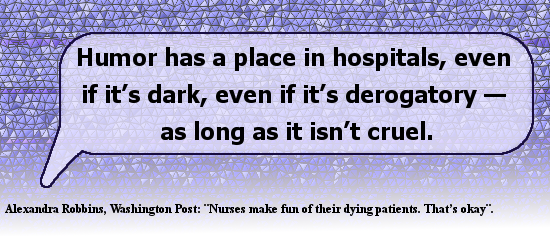That’s what Alexandra Robbins wrote in an opinion piece in the Washington Post last week (“Nurses make fun of their dying patients. That’s okay.“): “Humor has a place in hospitals, even if it’s dark, even if it’s derogatory — as long as it isn’t cruel.”
Do you agree?
And if you agree, how do you draw the line between “derogatory” and “cruel”?
Robbins wrote a book called The Nurses: A Year of Secrets, Drama, and Miracles with the Heroes of the Hospital, and tackled the tricky topic of gallows humor in her Post piece. The stories she recounts will feel familiar to many of you:
One of the nurses I followed for a year lamented that there’s no downtime or debriefing after traumas. “People die on our shift — sometimes several people in one day — and then we just go back to work,” she said.
In this context, dark forms of humor are a safety valve:
While gallows humor may seem crass amid patients who are coping with illness or injury, many nurses depend on it so they aren’t overwhelmed by sadness. A Texas nurse practitioner explained: “Sometimes when something happens that is so awful you want to cry, instead you use black humor to keep from crying.”
So they run contests about who finds the most “interesting things in obese people’s rolls of fat” (a tuna sandwich?), collect unlikely objects “retrieved from patients’ rectums” and might refer to dying patients as “circling the drain,” “heading to the ECU” (the eternal care unit) or “approaching room temperature.”
There’s no excuse for that kind of thing, many of the 1000+ readers who commented on the story feel. Among the most upvoted comments: “If I have to make fun of suffering and dying people to help me cope or feel better, than I would consider myself a sorry excuse of a person,” and: “It’s not okay, because at some point it stops being stress-relieving humor and instead becomes a vehicle for dehumanizing patients.”
Some of the backlash came from healthcare workers too: “After more than 30 years taking care of the sickest patients, I cannot understand why anyone in healthcare would make fun of a dying patient–or any patient, for that matter–unless one is joining in with the patient who might be making jokes about themselves,” wrote a user called sarahlucia. “It is crass, undignified and totally unprofessional behavior,” added a former RN.
In her article, Robbins quotes one expert who agrees:
“Derogatory and cynical humour as displayed by medical personnel are forms of verbal abuse, disrespect and the dehumanisation of their patients and themselves,” Johns Hopkins University professor emeritus Ronald Berk contended in the journal Medical Education. “Those individuals who are the most vulnerable and powerless in the clinical environment … have become the targets of the abuse.”
Not so, she argues. Derogatory humor in hospitals isn’t evidence of “an abuse of power and trust,” she argues, but a way for people who “care deeply about their patients” to catch their breath, bond with their colleagues, and cope with a feeling of powerlessness when a patient suffers or dies despite their best efforts:
Humor has been shown to decrease health-care workers’ anxiety, create a sense of control and boost spirits in difficult moments. This is important because they must get through traumas intact so they can be fresh and focused for the next patient and the next.
In short: “the benefits to the staff — and to the patients they heal — outweigh occasional wounded feelings.”
The nurses on Reddit’s /r/nursing forum agree. “[T]he general population has no idea what it’s like to be on the inside and deal with tragedy and sickness on a daily basis,” one writes; “I think humor is absolutely necessary for us to maintain a sense of composure and distance.” Another nurse adds: “I’ve had a patient suddenly die and then 5 mins after the code I have to go back to my other patients and pretend nothing has happened. [Ten] minutes ago I was breaking someone’s ribs and defibbing them. Now i am tending to your cut finger. Dark humor is what gets us by. It helps us deal and continue to care for other patients.”
But then where do you draw the line? When does “derogatory” turn into “cruel”? Is the only difference whether a patient might overhear you or not? Or is there more to it than that? What do you think?

